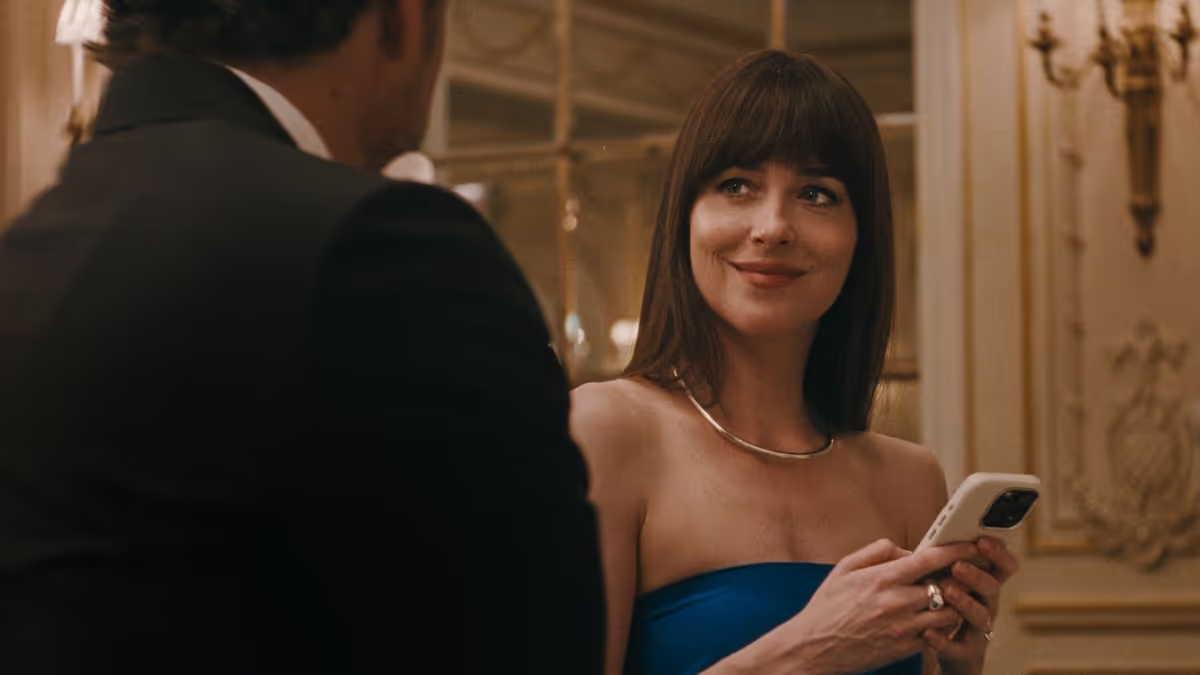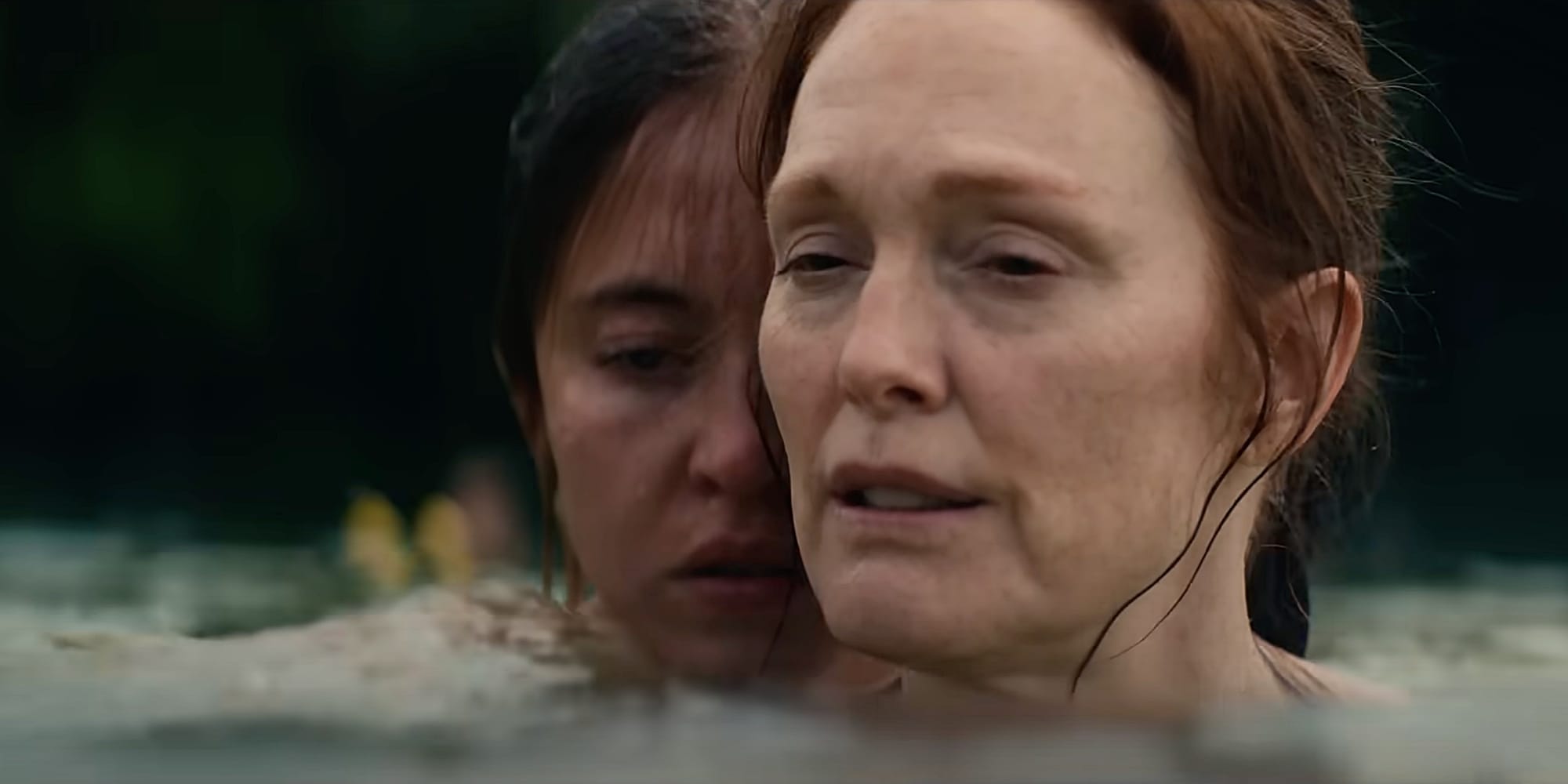In Review: 'Materialists,' 'Echo Valley'
Celine Song follows up 'Past Lives' with a look at love and money in modern New York while Julianne Moore and Sydney Sweeney try to spark some acting fireworks as a troubled mother/daughter team.

Materialists
Dir. Celine Song
117 min.
It’s clear from the first moment we see Lucy (Dakota Johnson) in action that she’s good at her job. She knows exactly what to say and when to say it without sounding practiced. She’s skilled at math, too, particularly complicated calculations in which some numbers can be a little flexible while others have to stay fixed or else the whole equation falls apart. That these calculations involve single New Yorkers in search of love doesn’t seem to bother her. She has the people skills to make her clients feel heard and liked and the processing power to know when a woman who is, say, looking for a man over 6-feet-tall who takes home a salary in the high six figures might be willing to give a bit on inches or income (though probably not both). It’s this combination that’s made her a star at the Adore matchmaking service. She knows how to close a deal, at least for others.
Past Lives director Celine Song’s second film, inspired by her own stint working as a matchmaker, flirts with then rejects committing to a couple of clichés. That Lucy has an uncanny knack for finding love for others but seemingly no interest in securing it for herself plays less like a gimmicky bit of dramatic irony than a professional hazard. When pressed, Lucy says she simply wants to marry rich, as if her on-the-job experience has taught her wealth and security might not assure true love, but it’s the least risky of all available options. When the film presents her with two love interests—one rich, one poor—it appears to be assembling the pieces of a love triangle, but the unusual angles don’t allow it to assume a pleasingly familiar shape.
The Reveal is a reader-supported newsletter dedicated to bringing you great essays, reviews and conversation about movies. While both free and paid subscriptions are available, please consider a paid subscription to support our long-term sustainability.
Both of Lucy’s possibilities arrive at the wedding of a client. Harry (Pedro Pascal) is blindingly rich and approaches her with the confidence of someone who knows exactly what he wants. Lucy tries to rebuff him by suggesting she take him on as a client, not a lover, but what good would that do when he’s already found his match? But Lucy finds her attentions divided by the near-simultaneous appearance of John (Chris Evans), an aspiring actor who’s there on a catering job and interrupts her conversation with Harry by arriving with her drink of choice in hand. Lucy and John have a history, it turns out, one in which their obvious fondness for one another wasn’t enough to keep them together.
Though it seems clear where the movie will go next, Song sidesteps the expected tug of war, following Lucy as she explores her options while simultaneously grows disillusioned with her job due to Sophie L. (Zoë Winters), a client who’s hard-to-match despite having an abundance of appealing qualities. In the parlance of the trade, she checks a lot of boxes, just never enough boxes, a situation that leads to a disastrous date that makes Lucy question whether what she does is worth doing, no matter how good she might be at her job.
Materialists is at its sharpest in early scenes exploring Lucy’s profession and what it might reveal about the nature of romance and commitment. Everyone wants to believe that love conquers all and other pleasant notions, but maybe it is a matter of numbers? And even if it’s not, how much discomfort can true love withstand? The film doesn’t provide any simple answers, following Lucy as she tries to harness chaotic forces that drive attraction and attempt to put a romantic spin on the sometimes craven reasons that drive couples to commit to one another. Love might be a transaction at heart, but is it so bad to feel valued?
Materialists loses some of this sharpness in its back stretch, but this also seems by design. As with her debut, Song moves at a deliberate pace and Materialists’ second half sometimes seems directionless until its intentions snap into shape and it becomes clear that the story needs all the space it occupies in order to unfold fully. The cast uses that airiness well. Pascal and Evans craft characters with strikingly contrasting charms and the film plays to Johnson’s gift for meaningful understatement. Lucy’s not someone who reveals what she’s thinking until she has to (and even then maybe not fully). They play characters waltzing on the edge of cynicism without tumbling in. That Materialists ends up becoming a love story in spite of its gimlet-eyed perspective is the one cliché Song doesn’t even try to escape. —Keith Phipps
Materialists opens in theaters tonight.


Echo Valley
Dir. Michael Pearce
103 min.
There’s a scene in Echo Valley, a mostly forgettable thriller doomed to the Phantom Zone of Apple TV+, where Julianne Moore and Sydney Sweeney, as a mother and daughter in a fraught relationship, are given the opportunity to really cook. Moore plays a woman who lives alone on a horse farm in rural Pennsylvania, where she’s still grieving the loss of her lesbian partner, a relationship that seemed to have brought her some happiness after her conventional marriage broke apart. Sweeney plays her daughter, a drug addict who has burned through multiple second chances, but realizes that her mother is the type of person who will give her one more. The two get into a screaming match over money that’s excruciating for both sides: The child who claims, surely for the umpteenth time, that she’s really in trouble, and the parent who’s resolved to give her a few boxes of Narcan and send her away.
Yet Echo Valley isn’t a story about addiction per se, and the performances by Moore and Sweeney, while excellent, are kindling for a plot-heavy scenario that doesn’t quite deserve them. Scripted by Brad Ingelsby, the creator of HBO’s superb miniseries Mare of Easttown, the film tries the same basic tactic of using an atmospheric, twisty crime thriller to evoke a particular region and the fraught lives of the characters within them. But the balance is a little off here, perhaps because Ingelsby and director Michael Pearce don’t have the time to marinate in the setting or the relationships for long. There are too many narrative rugs that need pulling.
Nine months after her partner’s death, Kate (Moore) still tends quietly to the upkeep on her farm, but her instinct to isolate herself further in grief has financial repercussions, because she’s stopped doing the riding lessons that have been paying the bills. When her daughter Claire (Sweeney) turns up in the middle of the night with a story about her junkie boyfriend (Edmund Donovan) breaking her phone in an argument, Kate agrees to buy her a new one, but that doesn’t turn out to be Claire’s last request for money. She and her boyfriend happen to owe a fortune to their dealer (Domhnall Gleeson), and the conflict leads to a violent incident that tests Kate’s devotion to her child.
The issue of trust between Kate and Claire in that situation becomes a genuine moral quandary. When Claire shows up on her mother’s doorstep with someone else’s blood on her shirt, Kate is forced to decide whether she must intervene or consider this another act of shady manipulation. Echo Valley is almost too quick to resolve that ambiguity, but the action does lead to a terrific back-and-forth between Moore and Gleeson, who’s much more sober and sure-handed in terrorizing a person who isn’t part of his criminal world. Though Ingelsby’s deftness in plotting pays off here as it did in Mare of Easttown, Echo Valley ends up feeling more like an actor’s showcase and a potboiler than anything that sticks to the ribs. Remember the title if you can: It’ll get you a 1% rarity score on Cinematrix sooner than you might imagine. — Scott Tobias
Echo Valley premieres on Apple TV+ tomorrow.





Discussion